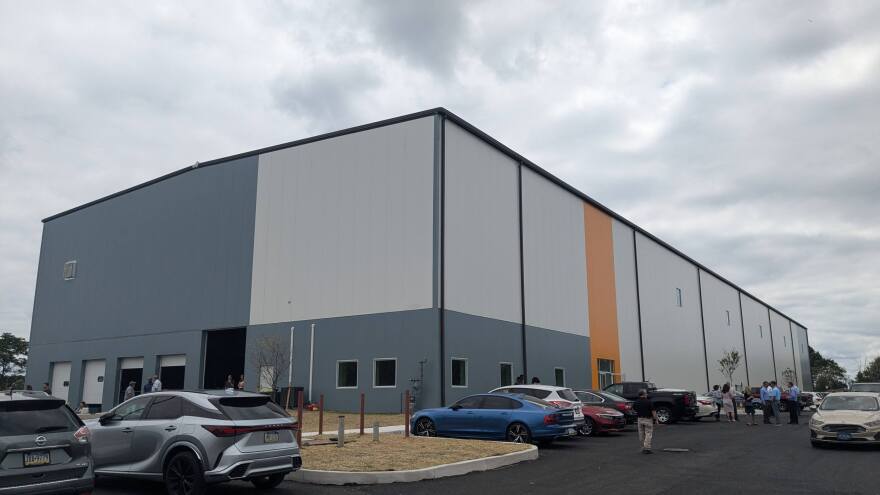BETHLEHEM, Pa. — The way land is used determines the character of a community.
Cities often have skyscrapers, tall apartment buildings and dense downtowns with many shops. Rural townships often have more spread out, single-family homes and farmland.
But why are communities developed the way they are? And who decides how they will grow?
Many don’t think about that until there’s a plan to build something that they don’t like. But according to Pennsylvania law, if that plan meets local requirements, a municipality cannot stop it from being built.
Because of that, advocates interviewed for this series of stories say getting involved before a plan is proposed is the best way for people to have an effect on the future of land use in their community.
This guide explains the basics of the laws governing land use in Pennsylvania and provides an example of the land development process.
Bolded words and phrases are defined in the glossary below.
Land use laws
In Pennsylvania, each municipality and county can make their own set of land use laws.
Those laws include the municipality’s zoning ordinance, for what a landowner can and can’t build on their specific property, and Subdivision and Land Development Ordinance (SALDO), for the process of how it can be built and what must be done as part of the development.
The power of these laws is governed by the Municipalities Planning Code (MPC). The MPC is statewide legislation that enables municipalities and counties to create the laws and outlines the process that municipalities must follow when making them.
Municipalities revise their land use laws using a process called land use planning.
Municipal employees, the local planning agency and the local governing body often create a comprehensive plan to guide the laws’ revision. A county is required to make a comprehensive plan, so if a municipality doesn’t, the county’s plan applies.

Municipalities have to have a place for every use, meaning they have to have a designated area for anything someone may want to develop, from an amusement park to a solar farm.
The only way to get around that regulation is to be part of a Multi-Municipal Comprehensive Plan. In that case, if one municipality has a place for a certain use, the others don’t have to have it.
Land use laws determine what conditions landowners need to follow when building something, such as requiring them to build sidewalks.
Municipalities can impose “reasonable conditions” to developments, the MPC says, but it still has to be possible to build what is permitted. Since what is “reasonable” can be up for legal debate, landowners may sue municipalities if they feel the conditions are too harsh.
The steps landowners have to take before building is called the land development process. During it, the plans for the development are reviewed by municipal employees, various municipal boards and the local governing body (explained below).
Landowners also have to apply for approvals and permits from state agencies such as the Department of Environmental Protection and the Department of Transportation.
Those agencies can also require conditions, like devising a plan to prevent pollutants from going into streams. They cannot stop developments from being built.
An example of the process
Let’s say Stacy Fakename wants to build a warehouse in False Township.
She would first need to check the False Township zoning ordinance to see which zoning district her property is in and what uses are allowed in that district.
If warehouses are a permitted use, for example, Fakename can begin the SALDO review process.
If False Township does not have a warehouse use, Fakename can speak with the zoning officer to see what other similar definitions are in the ordinance.

If something that is similar to “warehousing,” such as a “distribution center,” is a permitted use, the zoning officer may determine that warehousing is allowed, and Fakename can begin the SALDO review.
If warehousing is a use permitted by conditional use or special exception, Fakename has a few more steps to take. She will have to go before either False Township’s Zoning Hearing Board or its governing body for a hearing.
In those hearings, Fakename would have to prove that her plan meets certain criteria laid out in the zoning ordinance. Those who object to the plan can also testify at the hearing.
If the board or governing body approves the conditional use or special exception, it becomes a permitted use under zoning, and the SALDO review can begin.
Fakename would then take a plan for the site to the municipal planning agency for review and comments. The agency will often make recommendations for whether the governing body should approve or deny the plan.
Once before the governing body, local officials may attach requested or required conditions to the project before approval based on local environmental, stormwater, traffic, lighting or other needs. Again, these conditions must be “reasonable,” according to state law.
The governing body then votes on whether to approve, deny or table the plan for more review. If denied, the developer can appeal that decision to county court.
If the court finds the municipality acted incorrectly, the development may be “deemed approved.” That means the plan is approved by the court, despite the governing body’s denial.
Developers also have to get permits related to stormwater drainage, sewage use, environmental impact and more. The state agencies that give out these permits cannot directly stop projects from being built, but can require developers to change their plans if they do not meet standards.
After approval of a final land development plan and all other permits are acquired, construction can begin.
Glossary of terms
- Comprehensive plan: A comprehensive plan sets out long- and short-term goals for housing, transportation, infrastructure, preservation, zoning and other aspects of a municipality. It is a guideline for where future efforts and developments should go and what they should be like, but it does not have any legislative power in and of itself. It must be reviewed every 10 years, but does not necessarily have to be updated. If a municipality does not have a comprehensive plan, the county’s plan applies.
- Conditional Use: A use that is allowed under certain conditions outlined in the municipality’s ordinances. The governing body must host a quasi-judicial hearing in which the developer argues why its plan meets these conditions, and objectors may present facts that dispute that claim.
- Conditions: Something that a developer is required to do in order for its project to be approved. For example, a municipality could require warehouse developers to leave big spaces between the road and the building, called buffers. These conditions must be “reasonable,” according to state law.
- Governing body: The group that creates laws in a municipality. The name changes depending on the type of municipality. Examples include boards of commissioners, boards of supervisors, city councils and borough councils.
- Land development process: The steps a municipality must take to review a proposed development. This process occurs after the use is determined to be allowed under local law.
- Land use planning: The process through which entities such as counties and municipalities guide the way land is used.
- Multi-Municipal Comprehensive Plan: A comprehensive plan that is shared between multiple municipalities. In these plans, the municipalities can share uses amongst themselves. According to the Lehigh Valley Planning Commission, this is the only legal way for a municipality to completely prevent certain uses from being built in a municipality.
- Municipality: A community that has been incorporated by the state, giving it power to pass its own laws. Examples include cities, townships and boroughs.
- Ordinance: A law issued by a local municipality, rather than a state or federal body.
- Pennsylvania Municipalities Planning Code (MPC): The 1968 state law that outlines the planning process for every municipality in the state except Philadelphia and Pittsburgh.
- Permitted Use: Also known as a “by right use,” this is an allowed use that can be signed off by a zoning officer and does not have to go before any boards before moving on to the land development process. If a use is permitted, it is not legally possible for the municipality to stop it from being built.
- Planning agency (often a planning commission or planning department): These groups advise governing bodies on whether to approve plans and what changes should be made to make the plan follow the law. They also help create the comprehensive plan.
- Special Exception: The same thing as a conditional use, but the Zoning Hearing Board holds the hearing instead of the governing body. The name is a misnomer; there is nothing “special” about the use, and allowing it is not an “exception.”
- Use (noun): What type of buildings or activities can go on a property. Examples include, schools, hotels, houses, manufacturing facilities, amusement parks, and, well, pretty much everything.
- Zoning Hearing Board: A quasi-judicial body that makes decisions on specific types of land use appeals and applications. Members are appointed by the governing body of a municipality, but then act independently.
- Zoning officer: A municipal employee who makes decisions about what is and is not a permitted use under the zoning ordinance.
Other resources
Citizen’s Guide to the Permitting and Approval Process for Land Development in Pennsylvania
Pennsylvania Department of Community and Economic Development Planning Series
Summary of the Typical Residential Land Development Process in Pennsylvania


